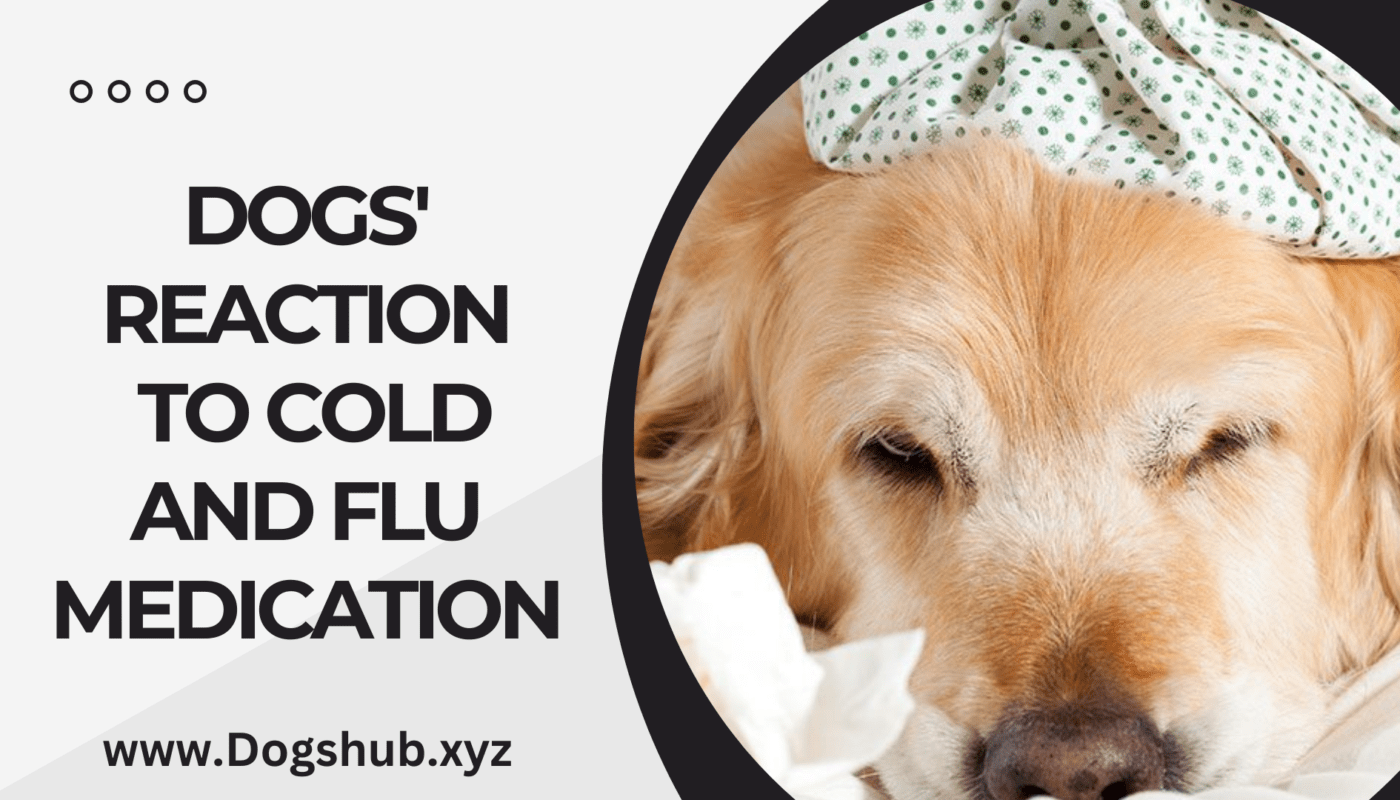What is Cold and Flu Medication Toxicity in Dogs?
Many people use prescription medicine for flu and cold to treat illness for benefit to ease congestion, fever and coughing. They can also benefit with sneezing, sniffing, discomfort, and different symptoms. Some of these drugs may be administered to dogs in certain circumstances but only after consulting your veterinarian.
If you think your dog may have swallowed medicine for colds or flu Please contact your vet as well as an emergency vet or the pet poison helpline whenever you can.
How Are Cold and Flu Medications Toxic to Dogs?
Human medicine for flu and cold available over-the-counter or prescription are made up of ingredients that could make pets sick. They can impact various parts of the dog’s body. The heart and blood vessels (heart as well as blood vessels) as well as the central nervous system (brain and spinal cord and the associate nerves) are more affected areas, there is also the digestive tract (stomach, intestines and colon) as well as the kidneys, stomach, as well as the liver, can be affect too.
What Cold and Flu Medications Are Toxic to Dogs?

- Acetaminophen (Tylenol, Paracetamol)
- Antihistamines*
- Chlorpheniramine (Clomicalm, ChlorTabs, Aller-Chlor)
- Clemastine (Dayhist)
- Diphenhydramine (Benadryl)
- Promethazine (Phenergan, Promethegan)
- Meclizine (Bonine, Travel-Ease)
- Loratidine (Claritin)
- Cetirizine (Zyrtec)
- Medicine for cough
- *Dextromethorphan (Delsym 12 hours, Robitussin Vicks Dayquil along with Nyquil, Tussin Cough DM and Robafen Cough)
- Cough is a common occurrence.
- Also, it may contain xylitol that is extremely toxic to dogs.
- Decongestants
- Imidazolines (over-the-counter topical decongestants)
- Oxymetazoline, xylometazoline, tetrahydrozoline, and naphazoline
- Nose drops
- Afrin
- Privine
- Nasop
- Triaminic
- Eye drops
- Albalon
- Visine LR
- Oral decongestants (tablets or capsules consumed by mouth)
- Phenylephrine (Sudafed PE, Benylin, Neo-Synephrine)
- Pseudoephedrine (Sudafed, Nasofed, Equiphed)
- Ephedrine
- Imidazolines (over-the-counter topical decongestants)
* Though all the medicines mentioned above are toxic for canines, there are a few that, if recommended by your pet’s vet and in the right quantity, may be beneficial to dogs suffering from certain medical issues.
Symptoms of Cold and Flu Medication Toxicity in Dogs
The clinical signs of toxicity from various cold and flu medicines could be:
- Acetaminophen
- Stomach upset (vomiting and diarrhea, or lack of appetite)
- Dry eye (redness, discharge, swelling around eyes)
- A swelling of the face the paws and face
- Many symptoms of liver disease
- Icterus (yellow coloration to mucus membranes and skin, eyes and gums)
- Weakness
- Depression
- The heart rate of the patient is elevate.
- Panting
- Abdominal discomfort
- Vomiting
- Drooling
- Antihistamines
- Central nervous system excitement/hyperactivity or depression/sedation
- The crowd is squealing with delight.
- Vomiting
- The rapid breathing (tachypnea)
- Heart rate elevation (tachycardia)
- Medicine for the cough
- In low doses, there are depressive effects while high doses can cause stimulation effects.
- Ataxia and stumbling
- Lethargy
- Agitation
- Stomach upset (vomiting, diarrhea)
- Hallucination
- Tremors, seizures
- Disorientation
- Fear, shaking
- Dilated pupils (mydriasis)
- Temperature of the body elevated (hyperthermia)
- In low doses, there are depressive effects while high doses can cause stimulation effects.
- Oral decongestants
- Agitation
- Hyperactivity
- Heart rate elevation (tachycardia)
- Hypertension of the blood vessels (hypertension)
- Tremors
- Topical decongestants
- Stomach upset
- Ataxia
- Depression
- Blood pressure that is low (hypotension)
- The body’s temperature is low (hypothermia)
- Heart rate that is low (bradycardia)
If your dog has ingested the flu or cold medication or you think they have a cold or flu the flu, don’t wait until your pet develops symptoms as it is crucial to act quickly. It is accurate to get your dog to the veterinarian’s office or an emergency facility whenever you can. The helpline for pet poison is suggest as well. The helpline could benefit to facilitate your treatment plan along with your vet.
Are Vitamins and Natural Medications Toxic to Dogs?
Vitamin C along with echinacea are considere to be the safest vitamin or herbal remedies which are often given to pets, however they may create mild stomach upset. But zinc can be extremely toxic for dogs in large doses. It can lead a dog’s body eliminate the red blood cells of its own which could lead to dangerous anemia.
The majority of multivitamins contain iron, which is poisonous to dogs. It can also result in burning and irritation of the oral lining and the gastrointestinal tract. If consumed in large quantities, iron may result in liver damage in dogs.
What to Do If Your Dog Ingests Cold and Flu Medication
If you think your pet may have ingested medicine for cold or flu, or has indications of toxic effects from medication and/or toxicity, you should contact your vet, the emergency hospital and/or the pet poison control center as quickly as is possible.
It’s not suggested to cause your dog to vomiting in your the house. In all cases, vomiting induced by your pet must be conducted under the assistance of a vet or the veterinary team. If induced vomiting occurs at home, it may cause serious health issues, like burnings from chemical substances or aspiration on the digestive tract.
It is vital to prepare all the information you can to your veterinarian as you can and include:
- Name of the medication
- Milligram dose of each tablet/capsule/liquid
- How much of the medication is not being ingested or suspected to be
- Ingestion timeframe for possible
It’s perfect to estimate the amount of medications your dog might have consumed to figure out the worst-case scenario.
Treatment Options for Cold and Flu Medication Toxicity in Dogs
Intoxication cases can be a bit frightening however, there is a solution available and the earlier it’s started and treated, the better. A veterinarian might decide to cause vomiting for your pet if the toxin has been consumed in recent times but the dog isn’t still showing evidence of toxicity.
If your pet has taken lots of medication for cold or flu the vet could introduce a stomach tube to clean out your pet’s stomach by drinking water. It is also possible to administer activated charcoal to prevent the medicine from entering the bloodstream and causing additional poisoning.
The treatment of flu and cold toxic effects of medications is focused on fixing the symptoms and offering supportive medical care since there is no cure for these drugs. It is crucial that dogs with this type of condition are protected from cold and noise and closely observed in order to warrant they are alert and breathing normal. It is likely that your dog has to remain overnight at the hospital.
IV fluids are given to benefit keep your dog well-hydrated and to keep your kidneys in good working order. The anti-nausea medication and the liver protectors can also benefit your dog heal from the effects of this toxic. In the event of anemia then a transfusion of blood will most likely be required.
Prevent Cold and Flu Medication Toxicity in Dogs
A good practice for taking medication is to keep every original container until the medicine is no longer needed for the event that information will be required. When repackaging medication by placing them in an organizer for pills or any other containers that are not medical, exercise the greatest care. While it may be tempting to carry a plastic bag containing Tylenol as well as vitamins, along with some cold tablets in your bag or purse be aware of possible dangers when your pet eats all of the contents.
Don’t give your dog medications unless you’ve consulted and given approval to its use by your vet. Never leave medication at the pharmacy or in bottles in the range of your pet. If you accidentally spill any medication take it off immediately to assure that your pet is not able to eat the medication.




